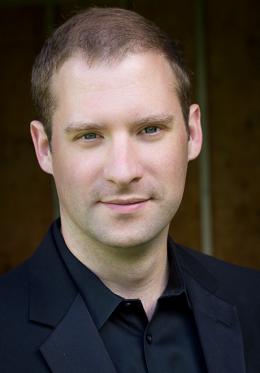“Canticle” premiere undone by Boston Cecilia’s rough-edged performance

George Case conducted the local premiere of Kile Smith’s “Canticle” with Boston Cecilia Sunday in Brookline.
While driving across Pennsylvania a few years ago, Kile Smith listened to an audiobook of the Spiritual Canticle of the Soul and the Bridegroom Christ by sixteenth-century Spanish writer and Catholic saint, John of the Cross.
He was immediately drawn to John’s mystical and even sensual imagery, so Smith set out to compose a choral work of the text, writing, as he says, melodies and harmonies that would move the listener the way the verses moved him.
The result was Canticle, an hour-long, multi-sectional work which guest conductor George Case and Boston Cecilia offered in its New England premiere Sunday afternoon at All Saints Parish in Brookline.
Though it doesn’t draw upon specific Christian symbols, John’s text is a journey of the soul to meet Christ. The Spiritual Canticle draws upon the literary style of “The Song of Solomon,” and the tale of spiritual fulfillment is told as an allegory of a bride coming to meet her bridegroom.
Without resorting to gimmicks or descriptive writing, Smith’s music allows for the text to ring clearly; the only obvious tone painting results in the personifications of the bride, sung by the women, and the bridegroom, sung by the men. His music also has an arresting beauty and delicate charm, and Smith’s melodic writing soars. Harmonies are thoroughly tonal, though he tends to color his chords upon with earthy dissonances.
In addition to the choir, Smith orchestrated Canticle for three cellos, and percussion. Sunday’s percussionist was Thomas Schmidt, who supplied glistening harmonies on the vibraphone, a tinge of dance rhythms in the tambourine, and a palpable heartbeat on the bass drum.
The instrumental writing offers some of Canticle‘s most stunning moments. Each of its three sections is prefaced by a Meditation, which unfolds in resonant, chant-like lines in the cello ensemble. Cellists Aaron Zelkowicz, Rafael Popper-Keizer, and Johann Soults played each with finesse and warmly radiant tone.
In the slow sections of Canticle, Smith’s vocal writing is eerily beautiful. “Answer of the Creatures” flowed in soft phrases, and the harmonies of “Swift-winged birds” seemed to fill the air like rain.
But his writing also demands a great deal from the singers. Wide leaps and thick textures dot this score. And it was in those moments where the singers of Boston Cecilia had a rough afternoon.
Tentative attacks marred more than a few entrances, and ensemble pitch fell flat in “O crystal spring” and “The little white dove,” the singers’ lines grinding out of tune with Schmidt’s shimmering chords on the vibraphone.
The climax of the work, “Our Bed is a Flower,” is richly scored. Flowing lines are woven into thick tapestries of sound and cellos supply a dance-like feel. Unfortunately, this section of Smith’s music failed to bloom in Sunday’s performance. Choral phrases sounded taxed, with one passage being flubbed entirely.
In other sections of the score, the performance fared better, and George Case, leading with gentle waving gestures, drew singing of stirring energy and crisp diction. “Let us Rejoice” sounded buoyant and nimble. The men of the ensemble brought deep resonance to their feature, “Return, My Dove.”
Some of the sweetest singing of the afternoon came in Cecilia’s performance of Smith’s Alleluia, which concluded the concert. Singing with bright ensemble sound, the choir delivered a reverential treatment of Smith’s long, silvery lines.
Posted in Performances
Posted Mar 12, 2018 at 2:55 pm by Carrie
I agree, it was a truly beautiful performance. Congrats, Boston Cecilia and George Case!